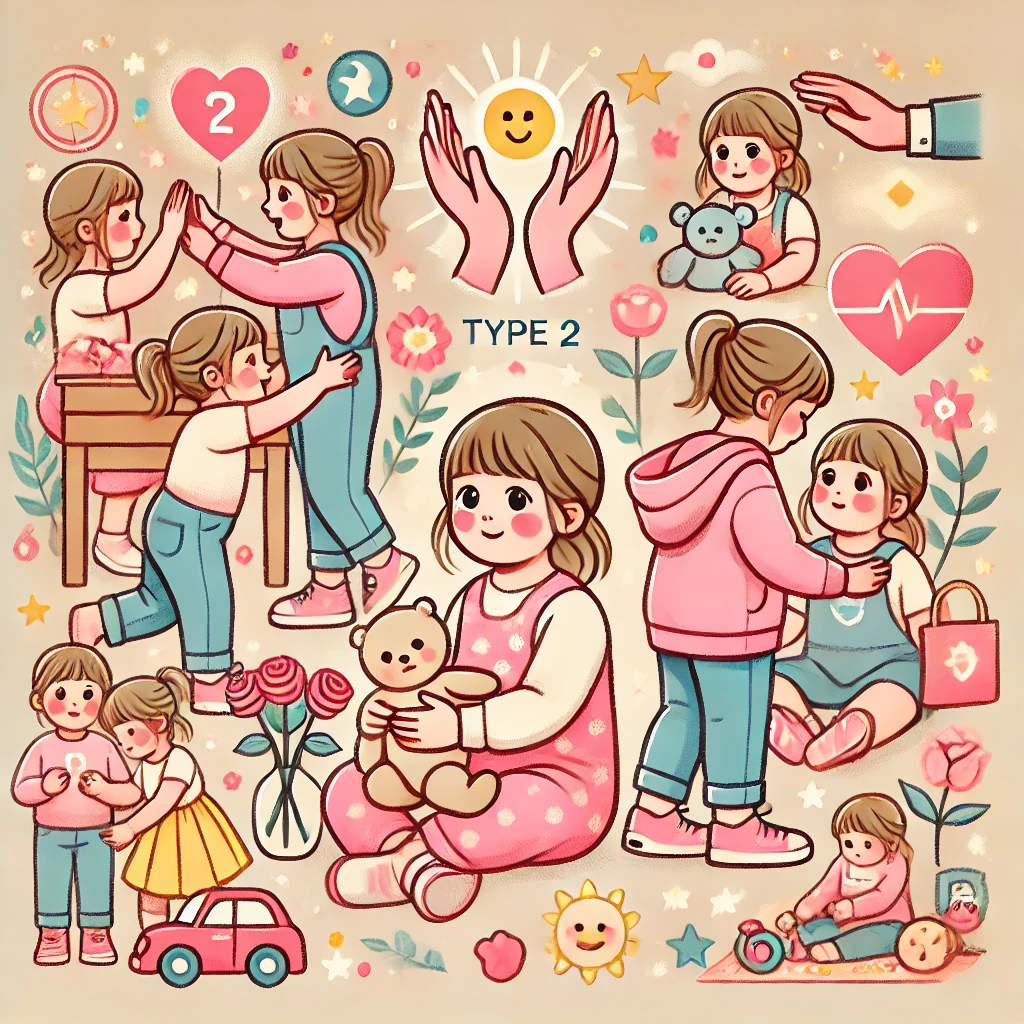Enneagram Type 2
The Helper
Learn all about the characteristics of the Enneagram type 2.
To discover your Enneagram type


Enneagram Type 2, known as "The Helper," is characterized by a deep desire to be loved and needed. They thrive on being supportive and nurturing to those around them. If you're a Type 2, you likely value relationships, compassion, and making others feel appreciated and cared for. However, you may also find yourself struggling with setting boundaries, neglecting your own needs, and seeking validation through your acts of kindness.
Despite these challenges, Enneagram Type 2s possess a unique strength in their genuine ability to connect with others and offer unwavering support. This innate empathy can foster strong, meaningful relationships and create a positive impact in the lives of those they help. By learning to balance their giving nature with self-care and self-awareness, Type 2s can harness their potential to create a nurturing and supportive environment while also finding personal fulfillment and resilience. Embracing their strengths and acknowledging their growth areas allows them to contribute meaningfully to their communities while maintaining healthy, reciprocal relationships.
Strengths
Challenges
Early Development

As children, those who identify with Enneagram Type 2 often show a remarkable sensitivity to the needs of others and a strong desire to be helpful. They tend to be warm, empathetic, and eager to please, often taking on a nurturing role among their peers and family. These kids are quick to offer support, sometimes sacrificing their own needs to ensure others are happy and cared for. Their interactions are characterized by a deep emotional connection and a strong focus on building relationships and fostering harmony.
This early inclination towards caregiving can be both a strength and a challenge for Type 2s. On one hand, their empathy and altruism make them beloved and valued by those around them. On the other hand, their tendency to prioritize others' needs over their own can lead to burnout and feelings of neglect. By learning to balance their natural generosity with self-care and setting healthy boundaries, these individuals can grow into resilient and compassionate adults who inspire and support others without losing themselves. Encouraging them to recognize and communicate their own needs can help them find greater happiness and fulfillment.
Young Adulthood

As they navigate their teenage years, Type 2 individuals often find themselves at a crossroads, balancing the typical quest for independence with their strong desire to be needed and appreciated. This stage of life can heighten their sensitivity to the emotions and needs of those around them, sparking a deeper commitment to support and nurture others. They may experience an intensified internal struggle, trying to balance their own emerging identity with their instinctive inclination to help and care for others. This conflict can lead to feelings of being overwhelmed or unappreciated as they wrestle with these complex emotions and strive to maintain meaningful connections.
During this period, it’s crucial for Type 2 teens to find supportive environments where their caring nature is valued and their own needs are also recognized. Encouraging them to engage in activities that allow them to help others, such as community service or peer counseling, can provide an outlet for their compassion and empathy. It’s equally important for them to learn the value of self-care and the understanding that their worth is not solely defined by their ability to help others. By finding a balance between their nurturing tendencies and their own personal growth, they can develop a healthier sense of self and a more balanced approach to relationships, ultimately leading them to become loving and self-aware adults.
Interpersonal Relationships:
Within the realm of relationships, Type 2 individuals stand out as warm and compassionate partners, always eager to support and nurture their loved ones. However, their interactions can greatly improve through cultivating a degree of self-awareness and setting healthy boundaries. It's crucial for them to recognize the importance of their own needs and understand that their worth is not solely based on their ability to help others. Embracing a balance between giving and receiving fosters healthier and more fulfilling connections. Understanding that they are valued for who they are, not just for what they do, is key to nurturing balanced and loving relationships.
Discover more about Type 2s in relationships.
Workplace Behavior:
Type 2 individuals thrive in environments that value empathy, collaboration, and emotional intelligence. Their natural ability to connect with others and provide support makes them invaluable team members. However, it's essential for them to maintain healthy boundaries to avoid burnout. By leveraging their strong interpersonal skills and genuine concern for others, they can foster a positive and cooperative work atmosphere. Balancing their tendency to help with self-care and assertiveness enables them to contribute effectively while ensuring their own well-being.
Explore further insights on Type 2s in the workplace.
Famous People With Type 2 Traits
Complex Figures with Type 2 Traits
Enneagram Type 2 Wings
Enneagram Type 2 wings are the adjacent types that influence Type 2, leading to two variations: 2w1 and 2w3. Type 2w1, "The Servant," combines the nurturing, empathetic nature of Type 2 with the principled, ethical traits of Type 1, resulting in a person who is both caring and conscientious, driven to help others while maintaining high standards. In contrast, Type 2w3, "The Host/Hostess," blends the supportive, helpful tendencies of Type 2 with the ambitious, image-conscious traits of Type 3, creating an individual who is both nurturing and success-oriented, striving to make a positive impact while seeking recognition and achievement.
Caring, conscientious, altruistic, and ethical.
Nurturing, success-oriented, charismatic, and supportive.
The 9 Types
Principled, purposeful, self-controlled, and perfectionistic.
Generous, demonstrative, people-pleasing, and possessive.
Adaptable, excelling, driven, and image-conscious.
Expressive, dramatic, self-absorbed, and temperamental.
Perceptive, innovative, secretive, and isolated.
Engaging, responsible, anxious, and suspicious.
Spontaneous, versatile, acquisitive, and scattered.
Self-confident, decisive, willful, and confrontational.
Receptive, reassuring, agreeable, and complacent.